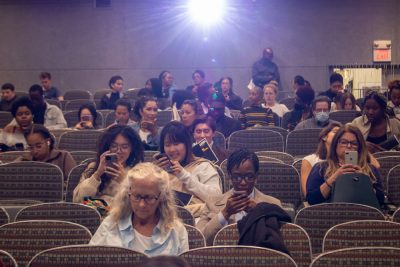Pitching ideas for a film is a nerve-wracking process for anyone, but Lynn Asare-Bediako, a junior in the College of Communication, said the pressure is amplified when you’re the only Black person in the room.
This frustration — plus the observation that no organizations at BU exist solely to amplify Black student filmmakers — motivated Asare-Bediako to join forces with her friend Lydia Evans, a junior in COM, to form BlackBox, a Black student film club that hosted its first annual film festival on Sept 22.

The film festival contributes to the club’s mission to “bring together Black filmmakers and artists at BU but also across the Boston area, together in a safe space where their stories and ideas can be shared,” said Asare-Bediako in her opening speech at the festival.
BlackBox received 14 films from Black student filmmakers in the greater Boston area, Asare-Bediako said. A panel of esteemed filmmakers — including DeMane Davis, who directed episodes of 2016 drama series “Queen Sugar” — narrowed the submissions to six finalists, which were shown at the festival, and selected an overall winner.
Xzaviah Stone Sr.’s horror film, “Nalb Noum,” took first place at the festival. The 2D animation — which employs the classic gore and jumpscares of horror to condemn the real-life horrors of racism — depicts three Black teens’ quest to prove the existence of a melanin-sucking monster.
“I think the scariest place in the world is to be in a white man’s imagination,” Stone said.
Stone said the BlackBox Film Festival offered him the Black audience he had intended for the film. With “Nalb Noum,” Stone said he aimed for authenticity over recognition and that the film is an “acquired taste.”
Asare-Bediako reiterated Stone’s sentiment of expecting to be misunderstood or overlooked in the film world.
“You always have to prove yourself,” she said. “You can’t make a bad film. You can’t be caught slacking.”
Kendel Dawson, a junior at Emerson College, was one of six finalists at BlackBox, his first film festival. His musical comedy, “My Friend Cupid,” features a bitter old man who recounts the failed love of his youth to a young couple on Valentine’s Day.
“It means a lot to have something I created be recognized,” he said.
However, he wishes skin color was not perceived as the defining characteristic of the work of Black filmmakers.
He wants his film to stand out “because of how good it is, not because of the colors of the skins of the actors,” he said.
BlackBox, Dawson said, was something he definitely wanted to be a part of because it was welcoming for Black creators. The struggle for authentic diversity in other film festivals proves the need for spaces like BlackBox Film Festival.
“Seeing Black people in this space where they don’t typically see Black people is inspirational,” he said.
Christopher Hope, an adjunct professor in COM, said the film industry does not depend entirely on the art, but rather the “commerce of art,” which caters to predominantly white, heteronormative standards.
“If you’re not producing that, you really run the risk of being put on the back burner,” Hope said.
Expectations confine Black people to a box, said Cambridge resident Tashawn Taylor, whose documentary was a finalist at the festival.
“Black folks are always expected to make a certain type of story,” he said. “I feel like a lot of white audiences only have the capacity to hear about the underdog story of being Black American or the Black person that has been suffering … Where’s the restitution?”
Stone said he noticed how Black characters are often misrepresented and, as a result, create only the illusion of diversity. There’s a palpable difference, he said, between Black stories written by Black writers and those written by non-Black writers.
The lack of diversity behind the camera is evident even in technical details, like the way many white filmmakers fail to properly light darker skin, said Asare-Bediako.
Hope said the BU community can do better to support its Black filmmakers. As of 2022, nearly 70% of BU’s faculty is white. Hope said he has been told by several students that he was one of few Black professors they have had at BU. The solution, he said, is to increase representation, not only among content creators, but also among educators.
In the meantime, Asare-Bediako said she hopes that BlackBox cultivates a sense of community and “continues to be a place for Black students to express themselves.”
Lydia Evans was the Editor-in-Chief of The Daily Free Press in Spring 2023. She was not involved in the reporting or editing of this article.


























































































































